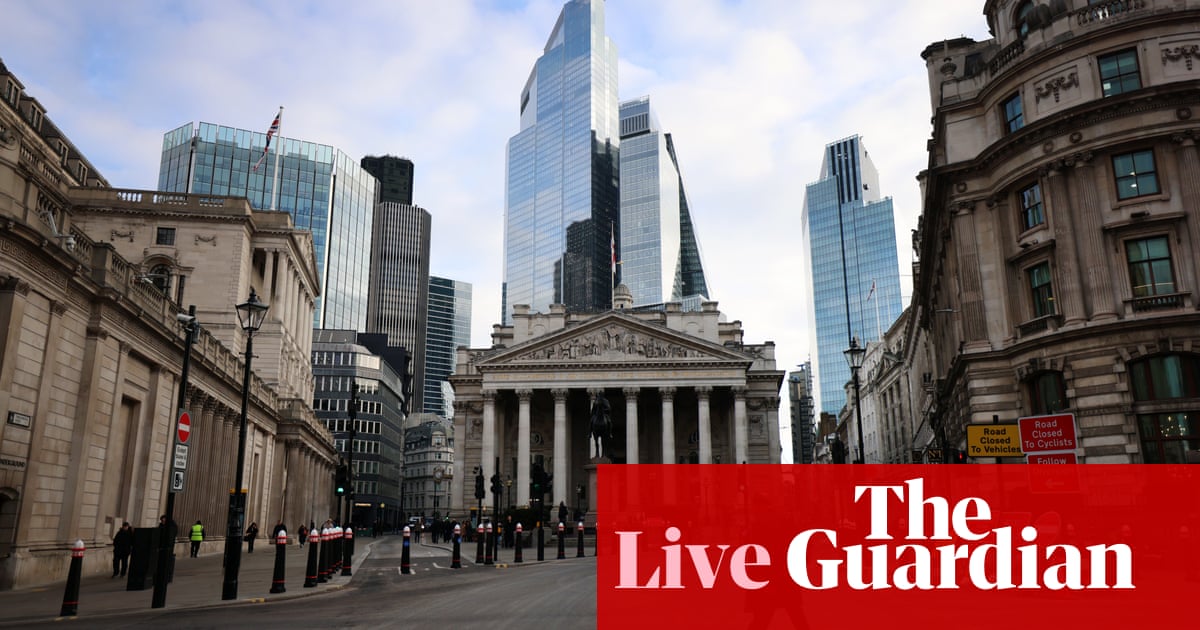UK sells £1bn of bonds on most expensive terms since 2004
More on today’s UK government bond auction (see post at 10.10am GMT) – Reuters have crunched the numbers.
The bond sale attracted solid demand, but it was on the most expensive terms since 2004, underscoring the cost to taxpayers from a recent sell-off in bond markets, which has pushed yields to multi-year highs.
The Debt Management Office sold £1bn of inflation-linked gilts due in 2054 and received bids worth 3.06 times that sum. While this was the weakest ratio for a linker sale since August, it showed healthy demand during a period of turmoil in the gilt market.
The bonds sold with a real yield of 2.126%, the highest seen at an auction of inflation-linked gilts since July 2004. The real yield refers to the annual return investors will receive above the inflation rate.
The UK has been among the markets most hit by a surge in global borrowing costs, reflecting concerns about rising inflation at home and in the United States, with reduced chances of interest rate cuts in both countries, and uncertainty over how Donald Trump will conduct economic policy when he takes office next week.
Investors are also watching to see how businesses are responding to a sharp increase in payroll taxes imposed in UK chancellor Rachel Reeves’ autumn budget. Many, such as retailers, have said they will be forced to raise their prices and may have to cut jobs.
Gilt yields are flat to slightly lower today in bond markets, a crumb of comfort for Reeves, after yields rose for six consecutive sessions.
Key events
Pound on track for sixth day of decline
The pound has declined further and is on track for its sixth day of losses, while government bond yields are little changed today, following sharp increases in recent days.
Sterling has dropped by 0.4% to $1.2156 amid general dollar strength, and concerns about UK assets. Yesterday, it hit the lowest level since November 2023 at $1.2097.
The dollar hovered near its highest level in more than two years against a basket of major currencies, as traders scaled back bets on US rate cuts this year after strong economic data.
The UK stock market is roughly flat (down 2 points at the minute at 8,221) while the German, French and Italian markets have gained between 0.8% and 1%.
The chancellor told MPs that while there have been “global movements in international markets,” the UK must do what it can to stick to its fiscal rules and grow the economy.
There have been global movements in international markets in the last week or so, and those have been global in nature.
But in the UK, we must do what we can.
Asked whether she had spoken to Bank of England governor Andrew Bailey about the sell-off in bond markets and what action can be taken to restore stability, she said:
Indeed, he was on the delegation to China with me this weekend, and we work closely together to ensure that the British economy remains competitive in global markets.
Reeves: must go ‘further and faster’ to achieve economic growth
Rachel Reeves has said the government must “go further and faster in our plan to kickstart economic growth”.
Speaking in parliament, she urged the Tories ‘get real’ over the rise in government bond yields, insisting it is an international problem.
I do not believe that it is reasonable to suggest that the reason why bond yields in the United States, in Germany and France have risen is because of decisions now by this of government.
More on our politics live blog with Andrew Sparrow:
Excluding food and energy prices, the ‘core’ rate of US wholesale inflation was unchanged last month from November but up 3.5% from a year earlier.
The producer price figures come a day before the latest consumer prices index is released, which is eagerly awaited by markets. Economists are forecasting an increase in the headline annual rate to 2.9% in December from 2.7% in November.
US factory gate inflation lower than expected
Factory gate inflation in the US was slightly lower than expected last month.
Factory gate prices rose by 0.2% in December, below November’s 0.4% increase, according to figures from the US Bureau of Labor Statistics. The annual rate rose to 3.3% from 3% in November, but was lower than the 3.5% forecast by economists.
Producer prices eventually feed through to consumer prices.
There was a 0.1% dip in food costs, including a 14.7% decline in wholesale vegetable prices.
Liz Ann Sonders, chief investment strategist at Charles Schwab, posted on X:
US wholesale inflation unexpectedly cooled in December, helped by a drop in food costs and and flat services prices that may help temper concerns of lingering price pressures. https://t.co/kvFmL2yohv
— Bloomberg (@business) January 14, 2025
Trump to address Davos remotely next week
Graeme Wearden
Donald Trump will address the World Economic Forum next week, just days after being swown in as US president.
The 47th US president will be one of the major world leaders to speak to those gathered at Davos for WEF’s annual meeting.
WEF’s CEO Børge Brende says this will be “a very special moment to learn more” about the new administration’s policy priorities.
Trump has previously visited twice in person, but I guess travelling so soon after the inauguration wouldn’t be sensible.
Ukraine’s president Volodymyr Zelenskyy will also speak on Tuesday, in person.
Davos will also hear from European Council president Ursula von der Leyen, China’s vice-premier Ding Xuexiang, and Argentina’s Javier Milei (who gave a barn-storming speech last year on the merits of free enterprise capitalism).
In total, 60 heads of states and governments will be in town, and 900 CEOs and chairs from leading companies.
Artificial intelligence, the climate emergency, and the global fragmentation will all be high on the agenda.
No decision on UK digital pound for two years

Graeme Wearden
A decision on whether the UK will embrace the digital pound will not come until 2027, the Bank of England indicated today.
In an update on its work on the digital pound, the UK’s central bank says a decision on whether to push ahead will not be taken for two years.
The BoE says no decision has been made yet, explaining:
After completing the design phase over the next couple of years, including taking account of developments in the wider payments landscape, the Bank and Government will assess the policy case for a digital pound and determine whether or not to proceed.
A digital pound would only be introduced with Parliament’s approval, the Bank adds, insisting that users’ privacy would be protected – so neither it nor the government could track people’s spending habits.
The Bank says a digital pound would be like an electronic version of the banknotes issued by the Bank of England.
But critics of central bank digital currencies fear they could be used to replace cash, or to allow governments to monitor – or even control – spending.
UK government sells down NatWest stake

Kalyeena Makortoff
It’s the final countdown to privatisation, with the government having again cut its stake in NatWest Group (formerly RBS) – this time down to 8.9% from 9.99% in December.
The government has been steadily drip-feeding shares into the market, benefitting from a jump in shares in recent months, with the stock reaching a 13-year high of 415p in December.
However, that is still shy of the 502p buy-in price that the government paid as part of a £46bn bailout of the bank during the financial crisis in 2008.
Some estimates, including by The Sunday Times, suggest the continued shortfall could leave the taxpayer with a £20bn loss by the time that the government sells off its remaining stake. But that could be mitigated by further dividends, including any announced at full-year results on 20 February.
NatWest CEO Paul Thwaite said last month that the government is likely to fully exit its stake by the end of June 2025.
He added would be a symbolic moment for NatWest Group staff and the wider banking sector, allowing the industry to close another chapter of the fallout from the 2008 banking crash.
NatWest said in a statement on Tuesday:
We are pleased with the sustained momentum in reducing HM Treasury’s stake in NatWest Group. Returning the bank to full private ownership is a shared ambition and one that is in the interest of all our stakeholders.

Daniel Boffey
A minister has accused Centrica, the owner of British Gas, of promoting “alarmist headlines” to secure government subsidies after its chief executive claimed the country had only a week’s worth of gas available amid freezing temperatures.
Lord Hunt, an energy minister, dismissed the company’s concerns that the UK had only enough gas in storage for one week, compared with 89 days for Germany, 103 days for France and 123 days for the Netherlands.
In response to questions about the country’s supply, Hunt told peers:
What we had was one company looking for government subsidies using the opportunity to make alarmist headlines.
Over the weekend, Gary O’Shea, chief executive of Centrica had claimed that the UK stood out in Europe in maintaining just a week of stored gas. He said:
The UK’s gas storage levels are concerningly low. We are an outlier from the rest of Europe when it comes to the role of storage in our energy system and we are now seeing the implications of that.
Gas is key to Britain’s energy supplies providing around 40% of the country’s electricity. Around 28m UK homes are reliant on gas boilers for heating and hot water.
UK sells £1bn of bonds on most expensive terms since 2004
More on today’s UK government bond auction (see post at 10.10am GMT) – Reuters have crunched the numbers.
The bond sale attracted solid demand, but it was on the most expensive terms since 2004, underscoring the cost to taxpayers from a recent sell-off in bond markets, which has pushed yields to multi-year highs.
The Debt Management Office sold £1bn of inflation-linked gilts due in 2054 and received bids worth 3.06 times that sum. While this was the weakest ratio for a linker sale since August, it showed healthy demand during a period of turmoil in the gilt market.
The bonds sold with a real yield of 2.126%, the highest seen at an auction of inflation-linked gilts since July 2004. The real yield refers to the annual return investors will receive above the inflation rate.
The UK has been among the markets most hit by a surge in global borrowing costs, reflecting concerns about rising inflation at home and in the United States, with reduced chances of interest rate cuts in both countries, and uncertainty over how Donald Trump will conduct economic policy when he takes office next week.
Investors are also watching to see how businesses are responding to a sharp increase in payroll taxes imposed in UK chancellor Rachel Reeves’ autumn budget. Many, such as retailers, have said they will be forced to raise their prices and may have to cut jobs.
Gilt yields are flat to slightly lower today in bond markets, a crumb of comfort for Reeves, after yields rose for six consecutive sessions.
Wellcome Trust pays investment team £11m as portfolio rises in value
The Wellcome Trust paid its investment executives more than £11m last year, including £5m for its chief investment officer, after its investment portfolio rose in value.
Its investment portfolio returned 5.2% in the year to 30 September, or 3.5% after inflation, and the portfolio is now valued at £37.6bn, up from £36.8bn the year before.
Charitable spending was £1.6bn last year, in line with its plan to pay out £16bn over the decade to 2032, but down slightly from 1.7bn the previous year.
Wellcome has backed the world’s first-ever vaccine against chikungunya, a debilitating mosquito-borne viral disease, which gained approval, through the Coalition for Epidemic Preparedness Innovations, co-founded by Wellcome and partners in 2017.
Wellcome also funded the early trials of Cobenfy, the first new drug for schizophrenia in 50 years.
The charity’s senior investment team was paid £11.1m last year, up from £9.5m the year before, dwarfing its governors’ remuneration of £803,665. Nick Moakes, the chief investment officer, received more than £5m, and is among the highest-paid charity workers in the UK. Moakes is leaving in March.
Wellcome noted that much of it will be deferred, depending on the future performance of its investment portfolio.
It argues:
Having an in-house investment team rather than outsourcing to external investment managers saves us hundreds of millions a year which we can spend on science to solve urgent health challenges.
Moakes will be replaced by two of the existing team who will become co-chief investment officers, Lisha Patel and Fabian Thehos.
Julia Gillard, chair of Wellcome’s board of governors, said:
This year, impacts from Wellcome’s work include a new treatment for schizophrenia, the first ever vaccine for the infectious disease chikungunya, and our new funding scheme for researchers from under-represented backgrounds in UK research to progress their careers.
Advances made by researchers we fund – and which we hope will have health impact in years to come – include insights into liver regeneration, drivers of autoimmune diseases, and a neural map of an adult fly’s brain which will help unlock new knowledge about how our own brains work.
We are well on track with our plan to spend £16bn between 2022 and 2032 on supporting science to solve the urgent health challenges facing everyone.
Google said it will engage “constructively” with the UK competition regulator, after the watchdog used new powers to launch an investigation into the US tech giant’s search services (see post at 10.16am GMT).
A Google spokesperson told Reuters:
We will continue to engage constructively with the CMA to ensure that new rules benefit all types of websites, and still allow people in the UK to benefit from helpful and cutting edge services.
Here’s our full story on JD Sports – the shares are still down by around 9%, making it the biggest faller on the FTSE 100.
The UK’s blue-chip index is now up 0.16% but lagging behind other European stock markets, which are up between 0.76% (Germany) and 1% (France).
JD Sports has cut profit expectations for the second time in eight weeks, blaming heavy discounting across the fashion market.
The retailer said it did not expect any growth in sales at established stores during the year and warned that annual profits would be no more than £935m, down from previous hopes of between £955m and £1.03bn.
Shares in JD, which also owns the Size?, Blacks and Millets brands in the UK, fell 10% as it cut forecasts below its previous expectations and warned of a tough economic backdrop for retailers.
The JD Group chief executive, Régis Schultz, said: “With these trading conditions expected to continue, we are taking a cautious view of the new financial year.”
Sales at established stores were down 1.5% in November and December in a “challenging and volatile market that saw increased promotional activity”, as a rise in sales in the final weeks of the year failed to offset a poor November.
Trading in the UK and US was particularly weak, while its stores outperformed its online arm, in contrast with Christmas trading at other listed fashion retailers, such as Marks & Spencer and Next.

